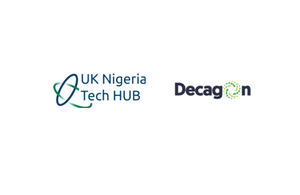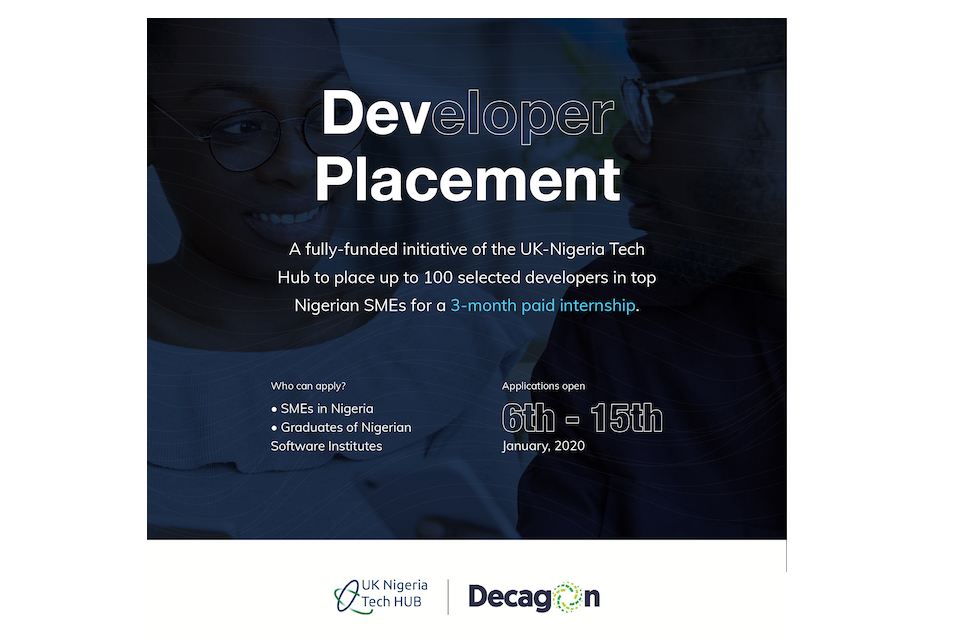UK-Nigeria Tech Hub Developer Placement Programme
Developing Nigeria’s local digital economy by providing employment opportunities and digital enablement

Decorative image
Part of DCMS’ International Tech Hub Network.
Overview
Challenge
High rate of unemployment and an untapped gig economy
Solution
-
3 month paid internship opportunities for software developers, leading to the possibility of full time employment
-
Digital enablement for SMEs and tech startups
Impact
-
100 software developers digitally upskilled via a 3 month paid internship
-
40 SMEs and tech startups digitally enabled
Background
Nigeria’s youth unemployment/underemployment rate stands at an extraordinary 42.5% (Q4 2020, Nigerian National Bureau of Statistics) - despite this figure, there is rising demand for digital talent. Supporting digital upskilling leads to increased job opportunities through entrepreneurship streams, as well as providing digital enablement for existing SMEs and tech startups which play a major role in developing Nigeria’s local economy.
To address these issues, the UK-Nigeria Tech Hub partnered with Decagon, a software development institute in Nigeria, to launch an intervention programme.
Programme
The Developer Placement Programme was designed to reduce youth unemployment by providing a pathway for software developers (with existing relevant skills acquired either through a bootcamp or through MOOC [Massive Open Online Course - an open educational resource]) to gain employment within partner SMEs and tech startups, enabling these to scale their social impact products.
Launched in January 2021, the programme was immediately very popular - receiving 1767 applications from individuals, and 734 from companies wishing to participate. Following assessment of applicants’ knowledge of software languages, 100 developers were selected. Companies were required to have a senior engineer as part of their team, and were evaluated based on their positive societal, environmental or economic impact.
All programme participants completed a preparatory bootcamp before starting internships in February, which ran through until the end of April.

Decorative image
The internship has provided me with exposure to industry code base, networking, and possibilities of better opportunities. The best new thing I’ve learnt in the job has been to write better Node.js code.
Agnes Ayuba, Developer Placement Intern
Tech Hub leadership
The UK-Nigeria Tech Hub fully sponsored all 100 software developers’ 3 month internships.
Through this partnership, the Hub has advanced local digital skills development leading to an increase in the number of technology products built and deployed. This stimulation of the local tech ecosystem facilitates growth in Nigeria’s economy, which the UK and other international digital sectors will benefit from.
Looking to the future
Following the programme, 72% of participating SMEs and tech startups reported an increase in diversity of their workforce. As a result of the internships, 15 new digital innovations addressing local development challenges were created.
75% of developers who participated reported increased digital skills, and 5 interns continued at their placement companies in full time employment.
For more information
Read local media coverage of the partnership:
TechCabal: 100 software developers in Nigeria gain internship opportunities
More about the Developer Placement Programme and the UK-Nigeria Tech Hub
To learn more about the programme and the UK-Nigeria Tech Hub, please contact: UK.Nigeria.Techhub@fco.gov.uk
UK-Nigeria Tech Hub can be found on Twitter, Instagram and Linkedin
The UK government’s Department for Digital, Culture, Media & Sport (DCMS) is building a global network of Tech Hubs. The International Tech Hub Network aims to forge innovation partnerships between the UK and international tech sectors, stimulate local digital economies; and build high-end digital skills to drive sustainable jobs and growth.
Contact the network at: international-tech-hub-network@dcms.gov.uk